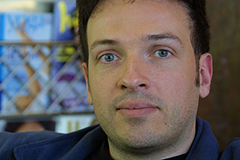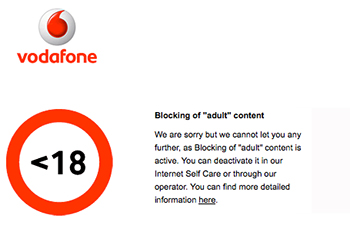Last summer, the British cell phone carrier Vodafone announced it would be offering a new filtering service for its Czech customers. “Child pornography and promotion of racism [are] such socially dangerous content that we have access to it automatically blocked for all of our customers,” said Philip Premysl, senior manager of corporate social responsibility of Vodafone in the press release.
But six months later, that filter also blocked pages on tech blogs, a chat server and a transportation site all based in the Czech Republic. Tech bloggers Radim Hasalik and David Biksadsky started a Facebook group called Stop Internet Censorship (in the Czech language) to protest the poor filtering by the cell carrier.
Hasalik, who I met on a recent trip to Prague, told me that the following sites were blocked erroneously by Vodafone’s filter:
1. Hasalik.cz: section with media coverage of Hasalik’s web projects
2. 30minut.cz: two articles, interviews about Internet marketing
3. Misantrop.cz: one article on tech weblog
4. xChat.cz: chat server
5. Firmy.cz: business directory
6. IDOS.cz: transportation site
7. Aiblog: story about how a student can save money with Vodafone
8. Mediatel.cz: telecom’s contact page

While Vodafone says it will fix any inadvertently blocked pages within 48 hours after notice, Hasalik says it took days to get his site unblocked from Vodafone’s service because of the Christmas holiday. He and Biksadsky met with a Vodafone representative and are trying to get the company to loosen its filtering methodology. The two bloggers are also protesting plans by T-Mobile to offer a similar filter this coming May. The leading cell provider in the Czech Republic, O2, does not plan to filter content and is instead hoping to educate children about using the Internet safely.
Hasalik was upset that the filter blocked his site, but also didn’t like the idea of a filter that is easily defeated.
“For me or children, it is very easy to cheat and use an anonymous online service or Google cache [to get around the filter],” said Hasalik via email from Prague. “Children are smart, so this tool is not working. It is only bothering customers.”
Why Cell Carriers Filter Content
Vodafone spokesman Miroslav Cepicky told me the carrier offers two tiers of filtering on its mobile Net services: one is the default filtering of child porn sites; the other allows parents to put on a “child profile” that blocks sites related to erotica, violence, drugs and alcohol, gambling, and weapons. I asked Cepicky what he thought about the Facebook group and its stand against Vodafone’s censorship.
“Vodafone’s aim is neither censorship nor any limitation of freedom,” he told me. “The opposite. Our activities protect the freedom of children. One of the basic principles of democracy is that freedom of one individual finishes where the freedom of another begins. Child pornography, which we block on the Internet, [violates] children and limits their freedom.”
Few would argue that illegal child pornography sites shouldn’t be blocked, but how does Vodafone decide on the blacklist? That list comes from the Internet Watch Foundation, an independent group funded by the European Union and the online industry, including telecommunication companies, internet service providers (ISPs) and mobile providers. About 95% of of UK Internet traffic is filtered via IWF blacklists, and many ISPs depend on IWF to decide which sites should be filtered rather than making the decisions themselves.
[See UPDATE2 below on responses from the IWF to this story.]

According to Danny O’Brien, international outreach coordinator for the Electronic Frontier Foundation, the IWF was created as an automomous, non-governmental body because the ISPs didn’t want to get regulated by the EU government.
“The IWF list was designed by ISPs in the UK who were scared that if they didn’t do something then they would be [regulated],” he told me. “The system they designed was trying to get around the problem that all of these filters have with overblocking. So they have a two-stage process. They have a list that’s converted to all these IP numbers. And when you go to a server that has this IP address, then the system says, ‘this looks suspicious’ but it may not be. So then it will be re-routed through another computer that will take another look. And when you hit one of the trigger URLs, you are blocked.”
Martin Maly, who runs the Misantrop.cz site that was temporarily blocked by Vodafone, said the inadvertent block might have been due to a change in IP address. “I recently have changed my web hosting, so I think the change of the IP was the reason of this temporary blocking,” he told me via email.
Vodafone’s Cepicky confirmed that a few sites were blocked temporarily by “technical fault.” He said that in the case of 30minut.cz, the site was only blocked for customers who activated the “child profile.” But Hasalik said that his site was blocked even when he had the “child profile” off. (Hasalik has a screencast of how the block looked.)
As far as the damage done by inadvertent blocks in the Czech Republic, opinions vary. Maly said that only 0.1% of his traffic came from Vodafone customers, and felt that Hasalik’s protest was overblown. It’s true that Vodafone is only the No. 3 most popular cell carrier in the Czech Republic, but Hasalik points out that they have 80% of the mobile web market because of a special offer for six months of free mobile Internet that brought in 230,000 customers=.
The Slippery Slope
Many people in the Czech Republic I contacted felt that the best way to solve the problem is to simply change carriers. “Don’t write petitions, don’t organize protests, boycotts or such activistic crap — just withdraw your contract with Vodafone and go to another ISP,” Maly said. Of course, with T-Mobile offering the same filtering mechanism, that would leave O2 as the only major remaining cell carrier that won’t filter.

The bigger problem is that so many carriers are now depending on independent groups like the IWF to maintain secret blacklists with no oversight or transparency.
“The IWF claims to concentrate exclusively on child abuse images, but they don’t have a statutory role,” the EFF’s O’Brien told me. “What they do is something that only they are the guardians of, and the same is true of a similar initiative in Germany which decides which sites should be removed from Google search results. People don’t talk about this, they talk about censorship in China, without realizing there are these very informal arrangements in Western countries, too.”
[See UPDATE2 below for more on IWF’s responses to my queries.]
Most of the blocking happens without people even noticing that sites are being blocked. But when clumsy overblocking or technical errors happen, then people notice. The IWF took heat when it blocked an album cover image on Wikipedia of a nude youngster on an old Scorpions album. The IWF decided the image was illegal and blocked the page, but it mistakenly blocked many other Wikipedia edit pages for UK users, causing an outcry. Eventually, the group decided to unblock the page.
JR Raphael of PC World wrote a thoughtful piece on the subject last month:
The IWF ultimately acts as the morality police for about 95 percent of the UK’s Internet users, and the fact that one non-government company has so much control over what’s decent and what isn’t is a bit alarming. Where does the UK government stand on all of this? Should its opinion count?…
Then you can consider the even broader implications: What other content may be deemed ‘immoral,’ if we’re willing to grant the ability to make that judgment to non-government organizations? Even if you agree that this particular image is offensive, so long as it is legal, are you willing to open that door?

Jiri Peterka, a Czech freelance journalist who teaches at Charles University in Prague, agreed that the IWF has too much power as judge and jury of the blacklist — without any legal standing.
“The whole isue is not black and white,” he said via email. “The real hardcore child pornography deserves to be blocked and publishers prosecuted. What I am worried with is the subtle and subjective distinction between harmful and non-harmful content (see recent Wikipedia case), and mostly the fact that the extent of the blocking is not known and not under public control — once operators start blocking child pornography, no one knows what else they are blocking. They may start blocking legitimate things, their competitors…”
Finding Solutions
Is there a way for the IWF and other filtering organizations to be transparent about the sites they block, without somehow promoting that information online? Already, the site Wikileaks has obtained and posted the site blacklist of the Thai government, which strangely enough includes Hillary Clinton campaign videos and Charlie Chaplin clips on YouTube.
The EFF’s O’Brien says that the IWF has been more public than other groups and governments that filter, but that its system is flawed from the start.
“The real challenge is that the sort of transparency you require for a censorship body isn’t the sort of transparency that an organization like this would accept,” he said. “These censorship systems are set up to protect people, but when you ask if it works, they admit that it doesn’t. It wasn’t really intended to. It’s like those checkpoints at airports. It’s security theater; they don’t really protect you from terrorists, but they make a grand display of looking like you’re being defended from terrorists.”
O’Brien points out that if the IWF finds out about child pornography sites abroad, they don’t contact the authorities abroad but simply block the sites. “That isn’t solving the problem, it doesn’t even block the sites from people who seek them out,” he said. “It’s like closing the blinds on a horrible scene you see outside.”
[See UPDATE2 below for IWF’s rebuttal to this point.]
Meanwhile, Hasalik and Biksadsky, who are running the Facebook group against censorship, have a list of reforms of the system they’d like to see from Vodafone, including:
> make a public list of the content that’s blocked
> allow people to disable the filter
> if the filter is disabled, Vodafone shows an alert where users must confirm they are responsible for visiting specific sites
> faster unblocking of innocent websites for people who complain to Vodafone
While Vodafone has met with the bloggers, they haven’t made progress on these points yet. O’Brien thinks it would be impossible for Vodafone or the IWF to be transparent about the content that’s blocked.
“We think if you’re going to have these kinds of organizations, then we will fight very hard to have the rule of law and due process introduced into them,” he said. “In practice, what you have then is that they’ll say, ‘we’d love to do that but if we publish the list then ne’er-do-wells will get ahold of it and access these sites.’ If all it takes for the ne’er-do-wells to access the sites is that list then your blocking system isn’t working. It’s an impasse. We think systems like this are just a distraction from what we really want, which is actual criminal investigations of people doing bad things.”
What do you think about the filtering system by Vodafone and the IWF blacklist? Should there be better regulation of blacklists or do you think these lists set up an impossible situation to police or check? Share your thoughts in the comments below.
UPDATE: The IWF is in another round of trouble in the UK, this time by heavy-handed blocking of the Internet Archive’s Wayback Machine. The Register reports:
Following complaints that its child-porn blacklist has led multiple British ISPs to censor innocuous content on the Internet Archive’s Wayback Machine, the Internet Watch Foundation has confirmed the blacklist contains images housed by the 85-billion-page web history database. But this fails to explain why Demon Internet and other ISPs are preventing some users from accessing the entire archive.
It will be interesting to see if the IWF will back down or how they will be able to selectively block specific pages from the Wayback Machine without overblocking by ISPs.
UPDATE2: I heard back from the IWF’s director of communications, Sarah Robertson, via email. She tried to clarify the role of the IWF to me:
Our list only contains URLs associated with indecent images of children according to UK law (Protection of Children Act). Although we also provide a notice and takedown service to all hosting companies and ISPs in the UK regarding criminally obscene and incitement to racial hatred content which is UK-hosted – these activities are distinct from our provision of the list. Blocking was an industry-led, voluntary initiative and our facilitation of it was designed in conjunction with our member companies. Accordingly, we provide a list of specific URLs — it is dynamic and is updated twice a day.
We don’t deal with harmful content, only content which is illegal under UK law. We were established to deal with indecent images of children (hosted worldwide) and criminally obscene content (UK only) in 1996 and incitement to racial hatred content (UK only) was added to our remit in 2000. Our remit has remained unchanged since then and restricted to illegal content.
As for O’Brien’s contention that the IWF doesn’t act on illegal images it finds abroad, Robertson said that wasn’t the case:
Details of every URL depicting an indecent image of a child hosted abroad (and therefore added to the URL list) are passed, with accompanying intelligence, to our law enforcement and ‘Hotline’ associates around the world, for further investigation. On the rare occasion that potentially illegal content within our remit is found to be hosted in the UK, we work in partnership with the police and the ISP or host company to remove the content and investigate its publishers.
As to the Wikipedia blocking, this was her response:
We didn’t block the page or the website. We added a URL depicting an image which was confirmed to be potentially illegal under UK law to the list. Companies implemented their blocking solutions accordingly. Wikipedia couldn’t tell who was editing their pages and therefore couldn’t keep out the banned users. Wikipedia blocked all unregistered UK editors. See this extract from Wikipedia:
“On 5 December 2008, the UK-based Internet Watch Foundation blacklisted the article Virgin Killer and the page of a related image, considering them to be potentially illegal in the United Kingdom. Several large Internet Service Providers (ISPs) that cooperate with the IWF subsequently blocked them from being viewed, affecting an estimated 95% of residential Internet users in the UK. Due to the way the block was enacted (via transparent proxies), users from the affected ISPs shared a small number of IP addresses. This meant that a user vandalizing Wikipedia could not be distinguished from all the other people on the same ISP. Unfortunately, the result of this was that all unregistered users from the affected ISPs were temporarily blocked from editing Wikipedia.”


Hi Mark, I’ve just read your post. And with most interest I watched Radim Hasalik’s screencast. It is bilingual, so even you must have noticed that the blocking that occurred was the result of the VOLUNTARY CHILD FILTER that works only for people who OPT-IN for it. And it works differently from the INVOLUNTARY (NO-OPT-OUT) blocking that is imposed on all mobile users of Vodafone CZ: the voluntary child filter has a much broader scope (blocking more content, including adult content offered by Vodafone itself on its mobile portal). So most probably the blocking of 30minut.cz had nothing to do with IWF, but with the local Vodafone blacklists, set up for the voluntary child filter.
This also explains our discussion on whether the blocking is visible: the CleanFeed, used with the IWF lists, intentionally gives no indication of the blocking. But the voluntary child filter, operated by Vodafone, acts differently and gives such an indication – the one that is shown in the screencast.
And BTW, I am very much opposed to “making a public list of the content that’s blocked”: this would expose the exact list of child pornographic sites to anyone, who then can use an anonymizer and ….. I suppose the goal is to make access to such sites harder, not easier.
Jiri Peterka: this settings was off (I can prove it, see: http://brouzdej.cz/blogy/radimh/7116.html), so blocking some website is reason of mistake.
Jiri,
I know it’s a bit confusing. According to Radim, he did not have the “child profile” on but got the block message that looks like the one you get with the “child profile.” Vodafone says the problem was with the “child profile” but that’s not what Radim experienced.
My take is that it was a technical error somewhere along the line. My criticism still stands for what the IWF is doing without oversight or transparency into their actions.
I sympathize with Radim. My mobile web portal at http://yeswap.com has been blocked by Verizon’s “Family Filter” for several months although it doesn’t contain or link to any adult content.
I’ve been unable to contact anyone at Verizon who can help me get this resolved.
@Jiri: it would be a public list of BLOCKED websites, so even if some weird people would like to follow a link, that link/IP is still blocked.
However, this is not the place to discuss on crime, psychology, psychopathology or ethics.
Nevertheless I find it a scary thought that people out there actually want restriction to information, even if it is to “protect” the viewers (or to prevent actions they might take after viewing information).
Information should be free and accessible to everyone.
Honestly, those days I read about IWF and such dirty companies all around the http. Articles usually try to encourage other people to leave Vodafone or whoever does the same censorship. I’m quite doubt if such campain will decrease the number of customers (or better amount of harvested money) more than by a fragment of percent. Most of their customers don’t care because their beloved bbc.co.uk works, or the were provided with this access by employer and one voice won’t change strategy of bigger company.
What about to try to convince the other side. If more important websites (e.g. bbc.co.uk ;-)) were blocking addresses of e.g. vodafone, giving back a page like “your provider supports censorship, use another one”, much more people would be affected and much more people would get informed. Convincing one customer to leave is IMO peanut, convincing one bigger web portal is IMO incomparablly more powerful. I believe I’m not he first to come up with that, but I didn’t find any initiative alike. Where’s the catch?
Don’t people have the right to choose not to have there web veiwing blocked ? ? Seems to me that isp providers are determind to impose these filters on us wether we want it or not . I’m having problems with vodafone at the momment and let me tell you now. They arn’t saving me from any immoral content, what there doing is royally pissing me off ! –
These lowlife people who put on horrible child or animal abuse images are breaking the law. The very act of posting these images on the web – should – SHOULD- provide the police with a fanastic unrefutable trail or evidance which should be enough to see these people prosocuted and locked up. By all means put more effort into locking these people up and charge me for it. That kind of censorship I want. But simply blocking websites on a whim will not work. Its wrong !!!
Then what happens when this person without a “child profile” gets sent to the slammer… they throw the key away? In the case of censorship should the company or ISP have the responsibility of monitoring these sickos. Blocking websites alone would not work. But then, if someone wants to access the porn and garbage, they will find a way.
Thanks, very nice!
Tech Guy Web Solutions will handle all aspects of your web presence. Affordable website design and development to SEO to reliable website hosting. We do it all. We specialize in Joomla web design.
http://www.techguywebsolutions.com
Last summer, the British cell phone carrier Vodafone announced it would be offering a new filtering service for its Czech customers. “Child pornography and promotion of racism [are] such socially dangerous content that we have access to it automatically blocked for all of our customers,
http://newtechnologyera.com
New Technology
Child pornography is really very dangerous so it should get blocked by providers. So appreciate that filtering services. It’s required.
Thanks for your great aricle in best of my knowledge it is good for new trainer in driving.For more taining andfor more answer regard this autobus then plse הסעות.